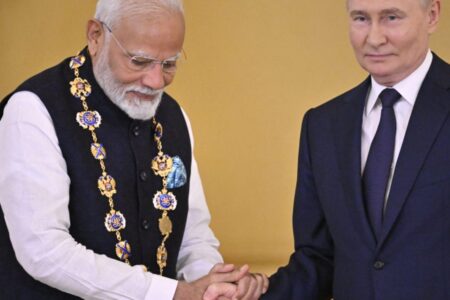India has become the second-largest supplier of restricted critical technologies to Russia, US and European officials said, highlighting the challenge faced by efforts to stifle exports that fuel President Vladimir Putin’s war machine.
Indian exports of banned items such as microchips, circuits and machine tools topped $60 million in both April and May, about double the previous months of this year, and jumped to $95 million in July, according to the officials, who requested anonymity to discuss the matter. Special evaluations. India is surpassed only by China.
What is most frustrating for Ukraine’s allies, some of them said, is that the envoys who raised the issue received little response from their Indian counterparts. The Indian Ministry of External Affairs declined to comment when asked about this trend.
The latest data means that nearly a fifth of sensitive technology entering Russia’s military-industrial complex arrived there via India, officials said.
The new data highlights the difficulty the United States and its allies have faced in reducing Russia’s ability to fight in Ukraine two and a half years after Putin’s forces invaded. Most of these dual-use items are banned from being exported directly to Russia, so the country has become accustomed to buying them from third countries – sometimes from unwitting affiliates of Western companies or networks of middlemen.
A State Department spokesperson said Friday that the department reiterates growing concerns with Indian government officials and businesses.
The United States and the European Union have focused most of their efforts on A List of technologies Existing in Russian weapons or necessary for their manufacture.
As the allies work to curb some of these routes — Türkiye and the United Arab Emirates have been major transshipment points — new hubs have emerged. These countries include India, Malaysia and Thailand, according to sources.
India’s role in shipping such goods poses another challenge because policymakers in the United States and the European Union want to strengthen partnerships with Prime Minister Narendra Modi’s government even as he works to strengthen ties with Putin. India has also emerged as the largest buyer of Russian oil despite allied efforts to restrict sales.
Officials say the main driver of this shift is the huge stock of rupees that Russia has collected from these oil sales.
India’s role as a transit point has made it the focus of EU and US sanctions agencies in recent months. Officials from those countries have visited several times in an attempt to push the authorities to crack down on the shipments, and several Indian companies have been subjected to Western sanctions.
In July, U.S. Deputy Treasury Secretary Wally Adeyemo wrote a letter to senior officials at the Confederation of Indian Industry warning of the sanctions risks faced by Indian companies and banks that do business with the Russian military industrial base, according to a copy of the letter obtained by the site. Bloomberg News.
